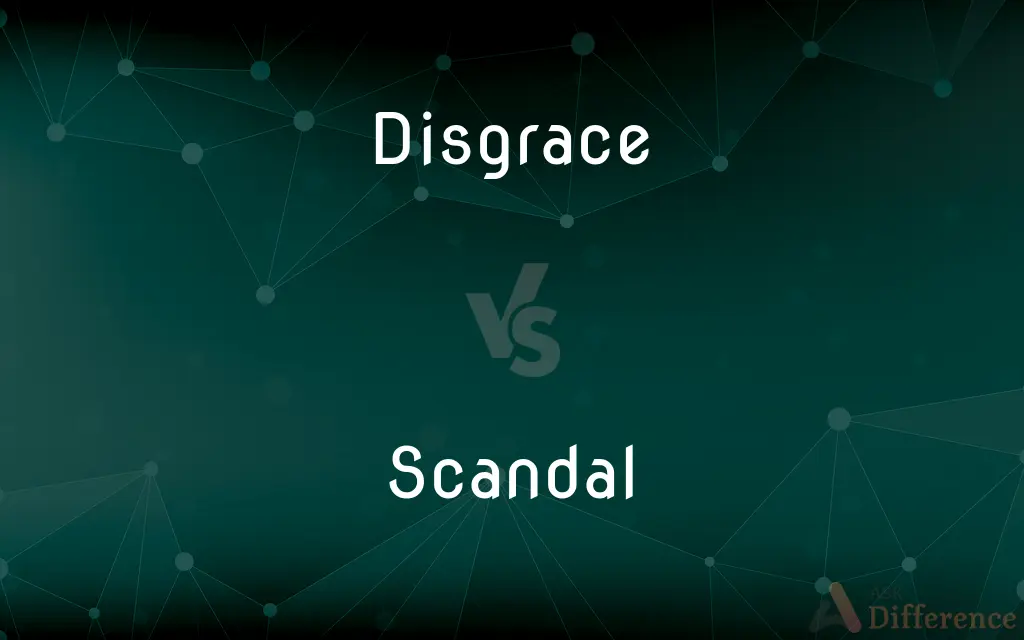Disgrace vs. Scandal — What's the Difference?
By Tayyaba Rehman & Urooj Arif — Updated on March 26, 2024
Disgrace is a loss of reputation or respect due to dishonorable actions, while scandal involves public outrage or shock, typically over moral or legal violations.

Difference Between Disgrace and Scandal
Table of Contents
ADVERTISEMENT
Key Differences
Disgrace refers to the state of losing honor or respect as a result of actions that are considered shameful or dishonorable. This concept is inherently personal and subjective, focusing on the individual’s or entity’s fall from grace in the eyes of others. Scandal, on the other hand, involves incidents or behaviors that become widely known and cause public outrage, shock, or dismay, often involving moral or legal breaches. Scandals usually gain public attention through media coverage or widespread discussion, emphasizing the collective reaction to the behavior or event.
While disgrace can be a private matter, affecting the individual’s perception within a smaller community or group, scandal is characteristically public and widespread. Disgrace may result from a variety of actions, not all of which attract public attention or result in scandal. Conversely, a scandal by its nature involves the public’s reaction to actions perceived as morally or legally reprehensible, often leading to a broader societal impact.
Disgrace often involves a personal or internal realization of dishonor, where the individual acknowledges their fall from societal norms or expectations. This internal aspect can lead to personal remorse, guilt, or a desire for atonement. Scandal, however, primarily concerns the external consequences of actions, including public criticism, legal repercussions, and the broader social and political fallout. The emphasis is on the collective shock and the ripple effects through communities or societies.
The consequences of disgrace are typically more personal and can include social ostracization, loss of personal relationships, or damage to one’s self-esteem. These effects are felt on a deeply personal level, affecting the individual’s life and possibly leading to a long-term impact on their reputation. In contrast, the consequences of a scandal can extend far beyond the individual involved, affecting entire organizations, governments, or societal norms, and often result in public demands for accountability, policy changes, or legal action.
While disgrace might lead to an individual’s reevaluation of personal ethics and behavior, potentially resulting in personal growth or redemption, scandals can catalyze widespread societal change. Scandals often expose systemic issues or flaws within institutions, leading to public debate, policy reform, and in some cases, significant shifts in public consciousness and social norms.
ADVERTISEMENT
Comparison Chart
Definition
Loss of respect or honor due to shameful actions.
Public outrage caused by immoral or illegal actions.
Scope
Personal or within a limited community.
Public and widespread.
Focus
Individual’s dishonor.
Public reaction and moral/legal violations.
Consequences
Personal shame, loss of status.
Public outcry, legal action, societal impact.
Potential Outcomes
Personal growth, atonement.
Policy reform, societal change.
Compare with Definitions
Disgrace
Loss of respect due to dishonorable actions.
The athlete faced disgrace after cheating in the competition.
Scandal
Involves media coverage and public discussion.
The celebrity scandal was front-page news for weeks.
Disgrace
Can occur without public knowledge.
She felt in disgrace even though her actions were not publicly known.
Scandal
Exposes systemic flaws.
The scandal exposed deep-seated corruption within the organization.
Disgrace
Personal dishonor affecting reputation.
The betrayal brought disgrace upon the family.
Scandal
Public outrage over moral or legal violations.
The political scandal rocked the nation, leading to widespread protests.
Disgrace
Often subjective and internal.
Despite public forgiveness, he could not overcome his own sense of disgrace.
Scandal
Can affect institutions or governments.
The financial scandal led to a complete overhaul of regulatory policies.
Disgrace
Leads to personal reflection.
Living in disgrace, he reconsidered his life choices.
Scandal
Demands public accountability.
The environmental scandal resulted in high-level resignations and reforms.
Disgrace
Disgrace is a novel by J. M. Coetzee, published in 1999. It won the Booker Prize.
Scandal
A scandal can be broadly defined as the strong social reactions of outrage, anger, or surprise, when accusations or rumours circulate or appear for some reason, regarding a person or persons who are perceived to have transgressed in some way. These reactions are usually noisy and may be conflicting, and they often have negative effects on the status and credibility of the person(s) or organisation involved.
Disgrace
Loss of honor, respect, or reputation; shame.
Scandal
A publicized incident that brings about disgrace or offends the moral sensibilities of society
A drug scandal that forced the mayor's resignation.
Disgrace
The condition of being strongly and generally disapproved.
Scandal
A person, thing, or circumstance that causes or ought to cause disgrace or outrage
A politician whose dishonesty is a scandal.
Considered the housing shortage a scandal.
Disgrace
One that brings disfavor or discredit
Your handwriting is a disgrace.
Scandal
Damage to reputation or character caused by public disclosure of immoral or grossly improper behavior; disgrace.
Disgrace
To bring shame or dishonor on
Disgraced the entire community.
Scandal
Talk that is damaging to one's character; malicious gossip.
Disgrace
To deprive of favor or good repute; treat with disfavor
The family was disgraced by the scandal.
Scandal
An incident or event that disgraces or damages the reputation of the persons or organization involved.
Their affair was reported as a scandal by most tabloids.
Disgrace
The condition of being out of favor; loss of favor, regard, or respect.
Scandal
Damage to one's reputation.
The incident brought considerable scandal to his family.
Disgrace
The state of being dishonored, or covered with shame.
Now she lives in disgrace.
Scandal
Widespread moral outrage, indignation, as over an offence to decency.
When their behaviour was made public it caused a great scandal.
Disgrace
(countable) Something which brings dishonor; the cause of reproach or shame; great discredit.
His behaviour at the party was a total disgrace! He was leeching on all the ladies, and insulting the men.
Scandal
(theology) Religious discredit; an act or behaviour which brings a religion into discredit.
Disgrace
(obsolete) An act of unkindness; a disfavor.
Scandal
(theology) Something which hinders acceptance of religious ideas or behaviour; a stumbling-block or offense.
Disgrace
(transitive) To put someone out of favor; to bring shame or ignominy upon.
Scandal
Defamatory talk; gossip, slander.
According to village scandal, they weren't even married.
Disgrace
The condition of being out of favor; loss of favor, regard, or respect.
Macduff lives in disgrace.
Scandal
(obsolete) To treat opprobriously; to defame; to slander.
Disgrace
The state of being dishonored, or covered with shame; dishonor; shame; ignominy.
To tumble down thy husband and thyselfFrom top of honor to disgrace's feet?
Scandal
(obsolete) To scandalize; to offend.
Disgrace
That which brings dishonor; cause of shame or reproach; great discredit; as, vice is a disgrace to a rational being.
Scandal
Offense caused or experienced; reproach or reprobation called forth by what is regarded as wrong, criminal, heinous, or flagrant: opprobrium or disgrace.
O, what a scandal is it to our crown,That two such noble peers as ye should jar!
[I] have brought scandalTo Israel, diffidence of God, and doubtIn feeble hearts.
Disgrace
An act of unkindness; a disfavor.
The interchange continually of favors and disgraces.
Scandal
Reproachful aspersion; opprobrious censure; defamatory talk, uttered heedlessly or maliciously.
You must not put another scandal on him.
My known virtue is from scandal free.
Disgrace
To put out of favor; to dismiss with dishonor.
Flatterers of the disgraced minister.
Pitt had been disgraced and the old Duke of Newcastle dismissed.
Scandal
Anything alleged in pleading which is impertinent, and is reproachful to any person, or which derogates from the dignity of the court, or is contrary to good manners.
Disgrace
To do disfavor to; to bring reproach or shame upon; to dishonor; to treat or cover with ignominy; to lower in estimation.
Shall heap with honors him they now disgrace.
His ignorance disgraced him.
Scandal
To treat opprobriously; to defame; to asperse; to traduce; to slander.
I do fawn on men and hug them hardAnd after scandal them.
Disgrace
To treat discourteously; to upbraid; to revile.
The goddess wroth gan foully her disgrace.
Scandal
To scandalize; to offend.
Disgrace
A state of dishonor;
One mistake brought shame to all his family
Suffered the ignominy of being sent to prison
Scandal
Disgraceful gossip about the private lives of other people
Disgrace
Bring shame or dishonor upon;
He dishonored his family by committing a serious crime
Scandal
A disgraceful event
Disgrace
Reduce in worth or character, usually verbally;
She tends to put down younger women colleagues
His critics took him down after the lecture
Disgrace
Damage the reputation of;
This newspaper story discredits the politicians
Common Curiosities
What constitutes a scandal?
A scandal involves actions or events that cause public outrage, shock, or moral indignation, often due to violations of ethical or legal standards.
How does society typically respond to a scandal?
Society often responds with public outcry, media coverage, demands for accountability, and sometimes legal action or policy changes.
Can an individual recover from disgrace?
Yes, individuals can recover from disgrace through personal growth, making amends, and regaining trust over time.
How do scandals affect societal norms?
Scandals can lead to a reevaluation of societal norms, spark debates about moral and legal standards, and drive social and legislative changes.
What defines a disgrace?
Disgrace is defined by a significant loss of respect or honor due to one’s dishonorable actions or behaviors.
Can a scandal affect political careers?
Yes, scandals can significantly impact political careers, often leading to resignations, loss of public trust, and electoral defeat.
Is disgrace always public?
No, disgrace can be a private feeling of shame or dishonor, not necessarily known or recognized by others.
How do legal systems respond to scandals?
Legal systems may initiate investigations, prosecute those involved, and implement new laws or regulations to prevent future occurrences.
Can a private matter become a scandal?
Yes, if private actions become publicly known and elicit widespread outrage or condemnation, they can escalate into a scandal.
What is the impact of a scandal on an organization?
A scandal can damage an organization’s reputation, lead to financial losses, result in leadership changes, and necessitate policy reforms.
What role does the media play in scandals?
The media plays a crucial role in exposing and disseminating information about scandals, influencing public perception and reaction.
Can a scandal have positive outcomes?
Yes, by exposing wrongdoing and initiating public discourse, scandals can lead to systemic changes and reforms.
How do cultural differences impact the perception of disgrace and scandal?
Cultural norms and values influence what is considered dishonorable or scandalous, leading to variations in reactions and consequences globally.
What psychological effects can disgrace have on an individual?
Psychological effects include shame, guilt, depression, and a profound impact on one’s self-esteem and social relations.
What is the difference between being in disgrace and being guilty?
Being in disgrace focuses on loss of honor and respect, whereas being guilty refers to the legal determination of responsibility for a wrongdoing.
Share Your Discovery

Previous Comparison
Roller vs. Wheel
Next Comparison
Renunciation vs. RenounceAuthor Spotlight
Written by
Tayyaba RehmanTayyaba Rehman is a distinguished writer, currently serving as a primary contributor to askdifference.com. As a researcher in semantics and etymology, Tayyaba's passion for the complexity of languages and their distinctions has found a perfect home on the platform. Tayyaba delves into the intricacies of language, distinguishing between commonly confused words and phrases, thereby providing clarity for readers worldwide.
Co-written by
Urooj ArifUrooj is a skilled content writer at Ask Difference, known for her exceptional ability to simplify complex topics into engaging and informative content. With a passion for research and a flair for clear, concise writing, she consistently delivers articles that resonate with our diverse audience.















































